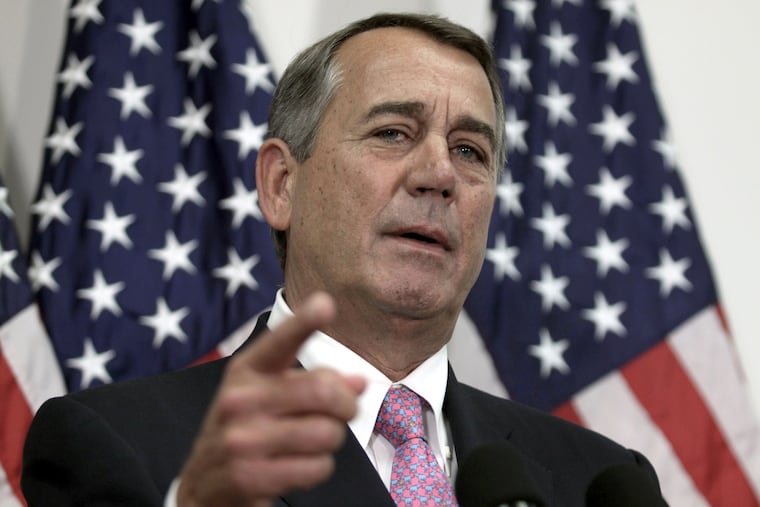Why U.S. cannabis companies are packing their boards with political and corporate heavyweights
Some of the world's best-known — if not best-loved — politicians and corporate leaders now serve as paid advisers to major weed concerns.

As Big Marijuana reaches for legitimacy in the national marketplace, the cannabis industry's top companies are packing their boards with stars.
We're not talking the likes of celebrity stoners, such as Willie Nelson or Snoop Dogg.
Some of the world's best-known — if not best-loved — politicians and corporate leaders now serve as paid advisers to major weed concerns.
Brian Mulroney, former Prime Minister of Canada, earlier this month joined the board of Acreage Holdings which operates marijuana-growing facilities in several states, including Pennsylvania. Mulroney sits on the board with former U.S. Speaker of the House John Boehner, who along with former Massachusetts governor Bill Weld, was named to the Acreage board in April. Weed hasn't seen a Caucasian trio this powerful since the Fabulous Furry Freak Brothers.
"This is a really savvy move," said Michael Useem, professor of management at the University of Pennsylvania's Wharton School of Business. "You want a mix of people with a range of skill sets on a board, including someone who knows how Washington works and how voters may vote when it comes to legalizing whatever you're doing.
"And John Boehner no doubt is as good an adviser as you can find on how to navigate Capitol Hill. "
While in office, both Boehner, a Republican who served in the House of Representatives from 1991 to 2015, and Mulroney, a conservative who was Canada's prime minister from 1984 to 1993, were openly hostile to marijuana.
Boehner once said he was "unalterably opposed" to legalizing the drug. But last week, he starred in an infomercial touting cannabis stocks. "My thinking on cannabis has evolved," Boehner tweeted on joining Acreage in April. Now he's "all in on cannabis," he said on Wednesday.
Mulroney's government tried to keep marijuana in the same legal category as heroin. He told the CBC this month that since he left politics, there has been a "sea change in attitudes in the reality of the use of cannabis." Ain't that the truth.
The Acreage board also includes the former chair and chief executive of Time Warner Telecom, Larissa Herda, and the former chief financial officer of IBM, Douglas Maine. Herda also served as chair and director of the Denver branch of the Federal Reserve of Kansas City. With banking a major stumbling block to cannabis industry expansion,
Herda's experience could be invaluable.
Cresco Labs, a Chicago cannabis powerhouse with operations in six states, including Pennsylvania, has a board heavy with giants from the business world, including John R. Walter, who once helmed AT&T and is the former CEO of R.R. Donnelly; Tom Manning, lead director of Dun & Bradstreet; and Gerry Corcoran, chairman of the Futures Industry Association.
"Running AT&T is not the same as growing marijuana," said Useem, who literally wrote the book on what makes a successful board of directors. "But the running of the companies is similar. It's about strategy. You know John Walter will provide wise counsel."
MedMen, often called the "Apple Store" of cannabis, will have a Pennsylvania presence after its recent blockbuster merger with Pharmacann. MedMen's board leans more to West coast glamour. Among it's directors are Antonio Villaraigosa, a former mayor of Los Angeles, and Jay Brown, who, with hip-hop music superstar Jay-Z, co-founded RocNation, the producers of the annual Made In America festival on Philadelphia's Benjamin Franklin Parkway.
The traditional function of a board is to protect a company's investors. In the realm of cannabis, the boards lend an air of gravitas and legitimacy. Both qualities have been difficult to establish given marijuana's pre-medical history — populated by cliched images of glassy-eyed hippies and hipsters. And don't forget that the federal government still considers nearly all commerce in marijuana to be absolutely illegal.
"The boards show the seriousness of the industry," said Philadelphia cannabis entrepreneur investor Lindy Snider. "The fact they can attract that kind of talent is very telling. They're not going to take these positions frivolously. It's a great indicator of where we're headed."
Other former heads of state who are now advising marijuana concerns include former president of Mexico (and former CEO of Coca Cola Latin America) Vincente Fox and former prime minister of Israel Ehud Barak.
The symbolism of corporate giants advising these companies can't be underestimated, Wharton's Useem said. "You want directors that institutional investors — the Fidelitys, the Vanguards, and the Blackrocks — can trust and have confidence in."
The board members, who also attract additional investment capital, are usually paid more than six-figures a year for their services, Useem said. Board members also get an equity stake in the companies.
"They're attaching their reputations to the cannabis industry, which is risky still," said Chris Walsh, founding editor and vice president of Marijuana Business Daily, the leading cannabis industry news source. "They're probably getting a handsome payout, but they also may be realizing that this is truly one of the next big American and global industries and they want to ride that train."
Brian McCormack, a director and co-founder of Cresco, said the board members are available seven days a week to advise company executives, "We can have a board meeting in 24 hours. That happens. We're not just dialing it in once a quarter."
And they truly believe in the company's mission, McCormack said, to provide marijuana as a replacement for opioids and to alleviate symptoms of PTSD and many other ailments.
"We have a chance to change the world and create an industry," said McCormack, an early Groupon investor. "We feel like we want to give back. John [Walter] believes in alternative forms of medicine. Tom Manning, who still runs Dun & Bradstreet, is a guy who loves to see young people build companies. It's more altruistic.
"They're not in it for large paychecks. They're already massively successful."